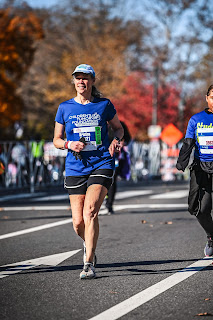Well!
The Philadelphia Marathon weekend was a very full one, and even included
a few surprises.
The weekend started out
uneventfully. On Friday I drove down to
Philadelphia and picked up my college roommate, Dara, in New York on the
way. We planned to meet up with another
of our roommates, Emily, who lives in Philadelphia, for a mini-reunion amidst
the races.
 |
| Road trip! with Dara at a rest stop in Jersey |
 |
| 30+ years of friendship |
 |
| At the Expo |
 |
| I couldn't get enough of this balloon display |
 |
| The runners! |
 |
| You can’t visit Philly without seeing Ben Franklin |
 |
| I met up with Lydia Vanderloo, who runs the NF Endurance Team at the Children's Tumor Foundation! She was running the full marathon on Sunday. |
 |
| Obligatory pre-race gear pic |
The half went well considering I did nine-tenths of my training on an elliptical. It was overcast and cool-ish (windy at times!), so a good temperature. My knee cooperated for the most part, which was also good! My goal was to finish under 2:15 and I ran 2:10 so I’m content. And Philly itself turned out—maybe it was the nice weather or just that Philadelphians rock, but there were mobs of cheering spectators for the event. Along the route I spotted two new favorite race signs: “HERE FEMORAL SUPPORT” and “Run like you’re young!”
After the half, I hung around the race zone because Emily was doing the 8K. She had the race on her bucket list, though hadn’t raced for a while. She trained for it but wasn't feeling super confident, so I volunteered to do it with her (“femoral support” LOL). She was thrilled with her finish, and because I did both races I'll get an extra "Patriot Challenge" medal. Wins all around! (You all know I'm sucker for the bling.)
 |
| Trying to stay warm between the half and the 8K |
 |
| On the course |
 |
| Finish line! |
 |
| Done |
 |
| Finisher selfie with City Hall |
 |
| I got my half medal but will get the 8K and Patriot Challenge medal later. The bells actually rings! |
The full marathon was held the next day. I knew two people running it—Lydia from CTF (who you met above) and Kate McCrann.
Dr Kate McCrann is a gastroenterologist
in Maine. For years we happened to both
be members of the same large online women physicians group. One day back in 2020 I posted something about
a challenging day at work, and Kate made a supportive comment “as a former
patient”—it turns out while covering for a colleague many years before I had
delivered her son! In fact, I was
pregnant with Jane at the time. We
started exchanging messages, and as we talked we discovered more and more
connections.
She was an undergraduate at Yale a few
years after me, in the same residential college (Morse!)
Her sister lives in Madison about a
mile away from us, and her nephew is in Jane’s class.
The most significant connection,
however, was that her daughter has a rare genetic disease—a mutation of the
USP7 gene that causes a neurodevelopmental disorder called Hao-Fountain
Syndrome. Kate not only fund-raises and advocates
for a cure for Hao-Fountain; she and her husband started an entire foundation
for the purpose: the Foundation for Hao-Fountain Syndrome. (www.usp7.org)
And one of the ways Kate raises money
for the Foundation for Hao-Fountain Syndrome?
She runs marathons! Can you even?
When I learned that Kate would be in
Philly running the marathon, I had hoped we’d finally be able to meet in
person again. Unfortunately, the weekend took
an unexpected turn.
While I was in Philadelphia, our son Alec
randomly collapsed at school and was admitted to a local hospital! He's
OK now. His EKG showed an arrhythmia, which will most likely be managed
conservatively, but because he is only 19 and previously healthy, they wanted
to do a zillion tests before they let him go home. So instead of resting
quietly with my feet up and ice on my knee after my races, I drove to St Luke's
Hospital in Bethlehem, PA to be with Alec in the Cardiac Care Unit! It
was fortunate that I was already in Pennsylvania. Needless to say it was not the weekend either
of us had planned on, but we are thankful that Alec is fine and we are back
home now.
After an action-filled weekend in
eastern Pennsylvania, I am looking forward to a quiet holiday weekend at home
with our family. We hope all of you have
a Happy and Healthy Thanksgiving.













